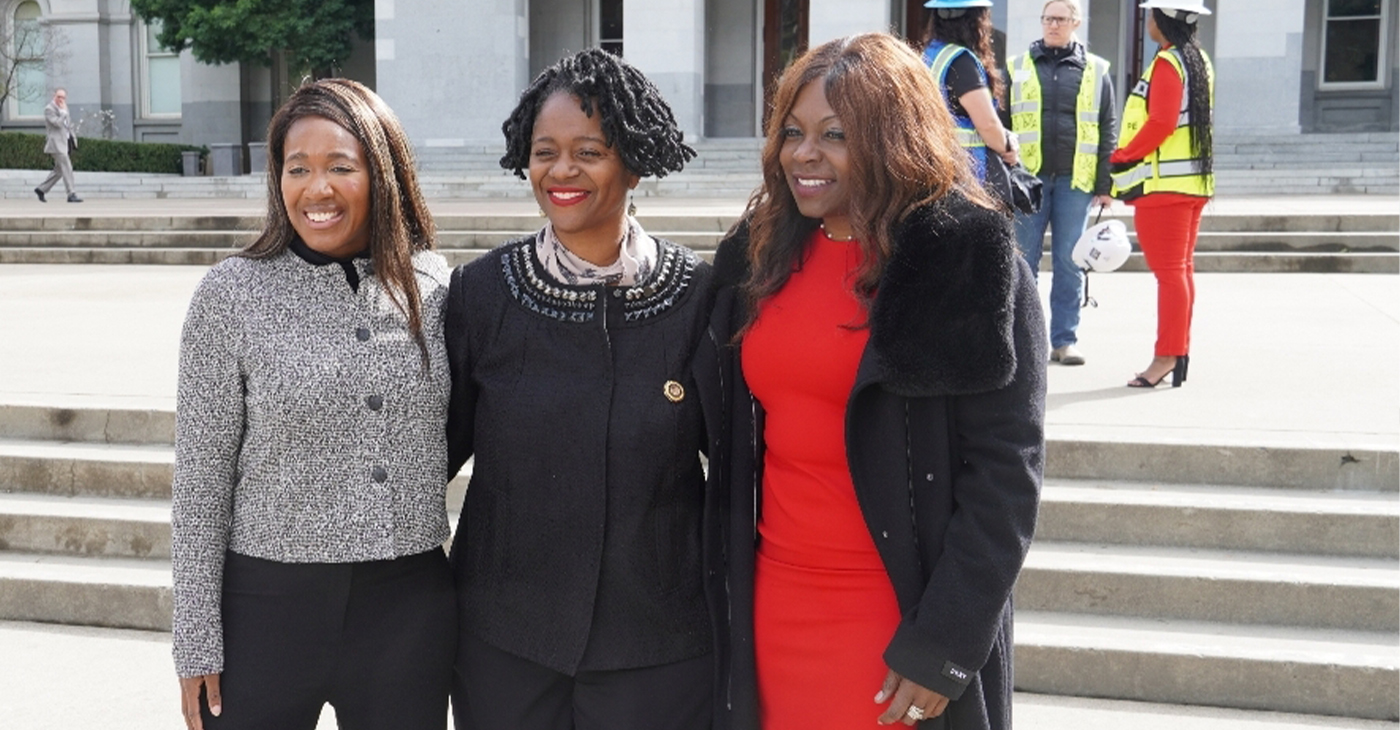National
About 100 Set Out to Retrace Selma-to-Montgomery March

People cross Edmund Pettus Bridge marching towards Montgomery, Monday, March 9, 2015, in Selma, Ala.to mark the 50th anniversary of “Bloody Sunday,” a civil rights march in which protesters were beaten, trampled and tear-gassed by police at the Edmund Pettus Bridge in Selma, Ala. (AP Photo/Butch Dill)
KIM CHANDLER, Associated Press
SELMA, Ala. (AP) — Dozens of marchers set out across Selma’s Edmund Pettus Bridge Monday with plans to walk to the Alabama Capitol, saying the voting rights won by blood in Selma 50 years ago are now under threat.
The marchers are recreating the Selma-to-Montgomery Voting Rights March of 1965. The 54-mile trek is recreated every five years, but organizers say this year is particularly important.
Marchers called for the restoration of the preclearance requirement of the Voting Rights Act. The U.S Supreme Court in 2013, in a case also arising out of Alabama, struck down the formula that determined which states had to get permission from the Justice Department before changing voting laws.
“The heart of it has been taken out,” Southern Christian Leadership Conference President Charles Steele, 68, said. Steele said about 50 people will try to make the full walk to Montgomery.
Here are some stories from the current march:
A NEW MOVEMENT
Bernard Lafayette, 74, was just 20-years-old when he joined the Freedom Riders to challenge segregation across the American South. He suffered three cracked ribs when he was beaten by a mob outside a bus station in Montgomery.
Selma was considered even more dangerous, he said.
Lafayette in 1962 volunteered to come to the city as a voter registration director with the Student Nonviolent Coordinating Committee
He was beaten by an unknown assailant in 1963, the same night Medgar Evers was murdered in Mississippi.
A black and white photo stored on the smartphone stashed in his jacket pocket shows him at the front of the march in 1965, alongside Andrew Young and other fresh-faced civil rights workers.
Lafayette smiled at the children, some as young as 11, walking ahead. That makes him optimistic about the future.
“Look at those young people up there. They are middle school, high school. We were the young people in our day. Now we see ourselves,” Lafayette said.
Behind him, young marchers sang a song with lyrics about Ferguson, Missouri, and Eric Garner — who died after being placed in a choke hold by a police officer in New York. ”
“That’s a new song. That’s how you can tell you’ve got a movement, when you’ve got new songs,” Lafayette said.
THEN AND NOW
John Rankin, 68, wearing an orange reflective vest and an “I love Jesus” button, walked past the charred and abandoned shells of homes on the now-closed Craig Air Force base on the outskirts of Selma.
The homes were turned into a low-rent housing development, but many are uninhabitable after being burned, vandalized or looted. The region remains swathed in poverty, he said, noting that the lock manufacturer where he worked as a lead man closed more than a decade ago.
“We have a long way to go. People need good jobs,” Rankin said.
Rankin was just a teen when he was cracked on the head by a club during Bloody Sunday.
“We were just expecting to go to jail we weren’t expecting to get beat up,” Rankin said.
Fifty years later, there is an African-American president and Jim Crow laws are long eradicated, but in some ways Selma is “not that much” different.
The schools are segregated again, he said, as white families pay for private school and the public schools are almost entirely black students or other minorities.
YOUNG MARCHER
Eleven-year-old Desiree Robertson carried an American flag helping lead the group of marchers down a rolling stretch of highway.
Does she think she’s up for the entire 54-mile walk? Well, yeah.
“I did it when I was 8. It was fun,” Robertson said.
Her uncles marched in 1965 and her grandmother is involved in the civil rights commemorations in Selma.
Robertson said she is missing school for the march, but learning history.
Copyright 2015 The Associated Press. All rights reserved. This material may not be published, broadcast, rewritten or redistributed.
Activism
Oakland Post: Week of March 28 – April 1, 2025
The printed Weekly Edition of the Oakland Post: Week of March 28 – April 1, 2025

To enlarge your view of this issue, use the slider, magnifying glass icon or full page icon in the lower right corner of the browser window.
Activism
Sen. Lola Smallwood-Cuevas Honors California Women in Construction with State Proclamation, Policy Ideas
“Women play an important role in building our communities, yet they remain vastly underrepresented in the construction industry,” Smallwood-Cuevas stated. “This resolution not only recognizes their incredible contributions but also the need to break barriers — like gender discrimination.

By Antonio Ray Harvey, California Black Media
To honor Women in Construction Week, Sen. Lola Smallwood-Cuevas (D-Los Angeles), a member of the California Legislative Black Caucus (CLBC), introduced Senate Concurrent Resolution (SCR) 30 in the State Legislature on March 6. This resolution pays tribute to women and highlights their contributions to the building industry.
The measure designates March 2, 2025, to March 8, 2025, as Women in Construction Week in California. It passed 34-0 on the Senate floor.
“Women play an important role in building our communities, yet they remain vastly underrepresented in the construction industry,” Smallwood-Cuevas stated. “This resolution not only recognizes their incredible contributions but also the need to break barriers — like gender discrimination.
Authored by Assemblymember Liz Ortega (D-San Leandro), another bill, Assembly Concurrent Resolution (ACR) 28, also recognized women in the construction industry.
The resolution advanced out of the Assembly Committee on Rules with a 10-0 vote.
The weeklong event coincides with the National Association of Women In Construction (NAWIC) celebration that started in 1998 and has grown and expanded every year since.
The same week in front of the State Capitol, Smallwood, Lt. Gov. Eleni Kounalakis, Assemblymember Josh Hoover (R-Folsom), and Assemblymember Maggie Krell (D-Sacramento), attended a brunch organized by a local chapter of NAWIC.
Two of the guest speakers were Dr. Giovanna Brasfield, CEO of Los Angeles-based Brasfield and Associates, and Jennifer Todd, President and Founder of LMS General Contractors.
Todd is the youngest Black woman to receive a California’s Contractors State License Board (A) General Engineering license. An advocate for women of different backgrounds, Todd she said she has been a woman in construction for the last 16 years despite going through some trying times.
A graduate of Arizona State University’s’ Sandra Day O’Connor College of Law, in 2009 Todd created an apprenticeship training program, A Greener Tomorrow, designed toward the advancement of unemployed and underemployed people of color.
“I always say, ‘I love an industry that doesn’t love me back,’” Todd said. “Being young, female and minority, I am often in spaces where people don’t look like me, they don’t reflect my values, they don’t reflect my experiences, and I so persevere in spite of it all.”
According to the U.S. Bureau of Labor Statistics, only 11.2% of the construction workforce across the country are female. Overall, 87.3% of the female construction workers are White, 35.1% are Latinas, 2.1% are Asians, and 6.5% are Black women, the report reveals.
The National Association of Home Builders reported that as of 2022, the states with the largest number of women working in construction were Texas (137,000), California (135,000) and Florida (119,000). The three states alone represent 30% of all women employed in the industry.
Sen. Susan Rubio (D-Baldwin Park) and the California Legislative Women’s Caucus supported Smallwood-Cuevas’ SCR 30 and requested that more energy be poured into bringing awareness to the severe gender gap in the construction field.
“The construction trade are a proven path to a solid career. and we have an ongoing shortage, and this is a time for us to do better breaking down the barriers to help the people get into this sector,” Rubio said.
Activism
Report Offers Policies, Ideas to Improve the Workplace Experiences of Black Women in California
The “Invisible Labor, Visible Struggles: The Intersection of Race, Gender, and Workplace Equity for Black Women in California” report by the California Black Women’s Collective Empowerment Institute (CBWCEI), unveiled the findings of a December 2024 survey of 452 employed Black women across the Golden State. Three-fifths of the participants said they experienced racism or discrimination last year and 57% of the unfair treatment was related to incidents at work.

By McKenzie Jackson, California Black Media
Backed by data, a report released last month details the numerous hurdles Black women in the Golden State must overcome to effectively contribute and succeed in the workplace.
The “Invisible Labor, Visible Struggles: The Intersection of Race, Gender, and Workplace Equity for Black Women in California” report by the California Black Women’s Collective Empowerment Institute (CBWCEI), unveiled the findings of a December 2024 survey of 452 employed Black women across the Golden State. Three-fifths of the participants said they experienced racism or discrimination last year and 57% of the unfair treatment was related to incidents at work.
CBWCEI President and CEO Kellie Todd Griffin said Black women have been the backbone of communities, industries, and movements but are still overlooked, underpaid, and undervalued at work.
“The data is clear,” she explained. “Systemic racism and sexism are not just historical injustices. They are active forces shaping the workplace experiences of Black women today. This report is a call to action. it demands intentional polices, corporate accountability, and systemic changes.”
The 16-page study, conducted by the public opinion research and strategic consulting firm EVITARUS, showcases the lived workplace experiences of Black women, many who say they are stuck in the crosshairs of discrimination based on gender and race which hinders their work opportunities, advancements, and aspirations, according to the report’s authors, Todd Griffin and CBWCEI researcher Dr. Sharon Uche.
“We wanted to look at how Black women are experiencing the workplace where there are systematic barriers,” Todd Griffin told the media during a press conference co-hosted by Ethnic Media Services and California Black Media. “This report is focused on the invisible labor struggles of Black women throughout California.”
The aspects of the workplace most important to Black women, according to those surveyed, are salary or wage, benefits, and job security.
However, only 21% of the survey’s respondents felt they had strong chances for career advancement into the executive or senior leadership ranks in California’s job market; 49% felt passed over, excluded from, or marginalized at work; and 48% felt their accomplishments at work were undervalued. Thirty-eight percent said they had been thought of as the stereotypical “angry Black woman” at work, and 42% said workplace racism or discrimination effected their physical or mental health.
“These sentiments play a factor in contributing to a workplace that is unsafe and not equitable for Black women in California,” the report reads.
Most Black women said providing for their families and personal fulfillment motivated them to show up to work daily, while 38% said they were dissatisfied in their current job with salary, supervisors, and work environment being the top sources of their discontent.
When asked if they agree or disagree with a statement about their workplace 58% of Black women said they feel supported at work, while 52% said their contributions are acknowledged. Forty-nine percent said they felt empowered.
Uche said Black women are paid $54,000 annually on average — including Black single mothers, who averaged $50,000 — while White men earn an average of $90,000 each year.
“More than half of Black families in California are led by single Black women,” said Uche, who added that the pay gap between Black women and White men isn’t forecasted to close until 2121.
-

 Activism2 weeks ago
Activism2 weeks agoWe Fought on Opposite Sides of the Sheng Thao Recall. Here’s Why We’re Uniting Behind Barbara Lee for Oakland Mayor
-

 #NNPA BlackPress2 weeks ago
#NNPA BlackPress2 weeks agoRev. Dr. Jamal Bryant’s Black Church Target Boycott Mobilizes 150,000
-

 Activism4 weeks ago
Activism4 weeks agoOakland Post: Week of March 5 – 11, 2025
-

 Activism2 weeks ago
Activism2 weeks agoSan Francisco Is Investing Millions to Address Food Insecurity. Is Oakland Doing the Same?
-

 #NNPA BlackPress4 weeks ago
#NNPA BlackPress4 weeks agoTrump Moves to Dismantle Education Department
-

 #NNPA BlackPress4 weeks ago
#NNPA BlackPress4 weeks agoFighting to Keep Blackness
-

 #NNPA BlackPress2 weeks ago
#NNPA BlackPress2 weeks agoRecently Approved Budget Plan Favors Wealthy, Slashes Aid to Low-Income Americans
-

 #NNPA BlackPress4 weeks ago
#NNPA BlackPress4 weeks agoFederal Firing Leaves Gaping Holes
























































